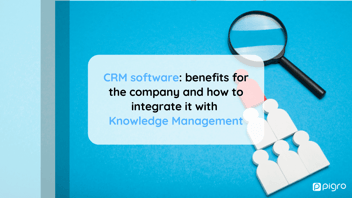Knowledge is the basis for a company that wants to create value for its customers. Having quick access to accurate information enables people to do their jobs better and also protects intellectual capital.
If you are reading this article, you will probably be interested in optimising business processes and increasing the performance of departments. Pigro provides knowledge management solutions to achieve these goals.
Contact one of our experts now, or continue reading the article to learn more!
Avoid the dispersion of company information
When all employees are able to record and share important information about problem-solving procedures, best practices, etc. (so-called tacit knowledge), loss of information is also avoided. This can also be linked to the context in which an employee leaves the company, for example, and takes all his or her intellectual capital away.
When these situations occur, company employees are often forced to waste time recreating or reconstructing lost information.
With an effective Knowledge Management system this can be avoided, as all knowledge is accessible, modifiable and sharable.
How to create a Knowledge Management system?
Just like CRM (Customer Relationship Management), of which it is the basis, the implementation of KM depends on processes, technologies and corporate culture.
As far as processes and technologies are concerned, today there are many opportunities to build a KM system and they are easily accessible by each company: a great deal of software is available on the market, some easier to implement, others less so, but there are solutions to meet all needs and requirements.
Culture, on the other hand, is perhaps the most difficult element to modify, as it involves changing the point of view of everyone working in the company.
Employees often jealously preserve their knowledge gained from years of experience in the workplace because they believe that by sharing it they will lose their 'privileges' and their 'expert'' status.
In this respect, it is important that change and openness towards knowledge sharing come from the top: for example, setting up bonuses or rewards for those who share information and collaborate with their colleagues in the development of innovative ideas can be an incentive for those who are still reluctant to share and keep track of their methods and proven procedures.
In this way, knowledge management, in the literal sense of 'management of information', becomes a key tool for driving innovation between departments and within the company itself.
Customer Knowledge Management to foster collaboration between Sales and Marketing
CRM is traditionally perceived as a sales tool, but actually, if implemented effectively, it can bring benefits to all company divisions, from Marketing to Human Resources.
In this regard, we have seen how CRM is closely linked to the concept of KM, finding expression in the strategy of CKM - Customer Knowledge Management.
When customers receive fast and accurate answers, they are more likely to build up a good opinion of the company and be satisfied with the service provided. For this reason, it is important that all those who directly or indirectly deal with customers, and not only Customer Service operators, can count on quality support materials and have easy access to the information they need to do their jobs.
Despite the role difference between Marketing and Sales, it may happen, for example, that the marketing team needs to access information on the status of negotiations with a customer, so as to be able to direct targeted communication actions to conclude the purchase. Implementing Knowledge Management activities is the most effective way of making a centralised source of know-how available to all company teams.
To ensure Sales Marketing alignment it is necessary to have a clear idea about your knowledge base: is the information inside it shared with the right people? Are the documents up-to-date? Is the content accessible and usable?
Pigro offers the possibility to analyse the efficacy of the knowledge base content and provides actionable insights on any issues that affect its quality and any possible improvement.
The benefits of circulating information affect the entire organisation. If a customer is given slow or ineffective answers, he or she will not be inclined to receive advertising or communications from the same company with which he or she is dissatisfied. Conversely, a customer who is satisfied with Customer Care will have a positive view of proactive CRM actions, both on the marketing and sales side.
To fully exploit the benefits of a CRM strategy it is, therefore, necessary to create synergy between the sales and marketing departments. The exchange of information is essential in order to save time when resolving customer queries, tickets or problems with internal procedures. Quality of service is the key factor.
How Pigro automates Knowledge Management
If implementing a Customer Knowledge Management system seems like a time-consuming and costly process, the artificial intelligence developed by Pigro offers a solution.
It makes it possible to import all the documentation that makes up the company's Knowledge Base, a unique and unrepeatable asset, in any format and from any repository.
The aim is to browse, like a real search engine, all the information that is already part of the company's assets, through a simple and intuitive, user-friendly interface.
Thanks to a proprietary algorithm, Pigro automates the training phase of the system, i.e. it extracts all possible questions and answers from the documentation.
Each query or question in natural language coming from the collaborators will correspond to a precise and punctual answer extracted from the Knowledge Base, with the possibility of viewing the entire source from which it comes.
Each research carried out can be saved and shared with colleagues and, if the information sought is not present in the documentation, Pigro highlights the knowledge gaps, allowing the gaps to be filled.
The time saving is evident, both in the performance of work activities, but especially in the implementation phase of the entire system, which does not require changes or transcription of the Knowledge Base to be usable and is constantly updated (without human effort) according to the changes made.
Read more:
-
How to build a Knowledge Base to manage business information
-
Business resources: what they are and how they can be best managed
Do you want more information about Pigro? Please contact our team!




